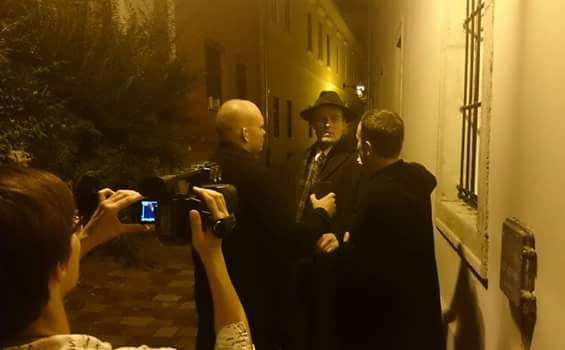
Feb 12, 2016 | Focolare Worldwide
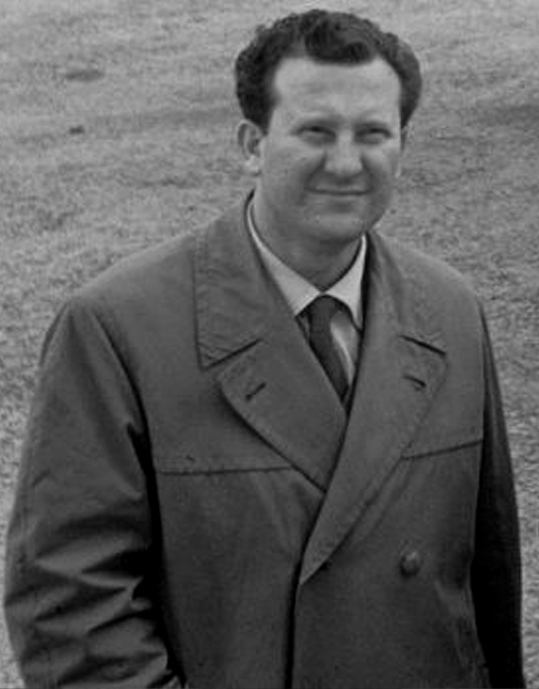
Guido Mirti (Cengia)
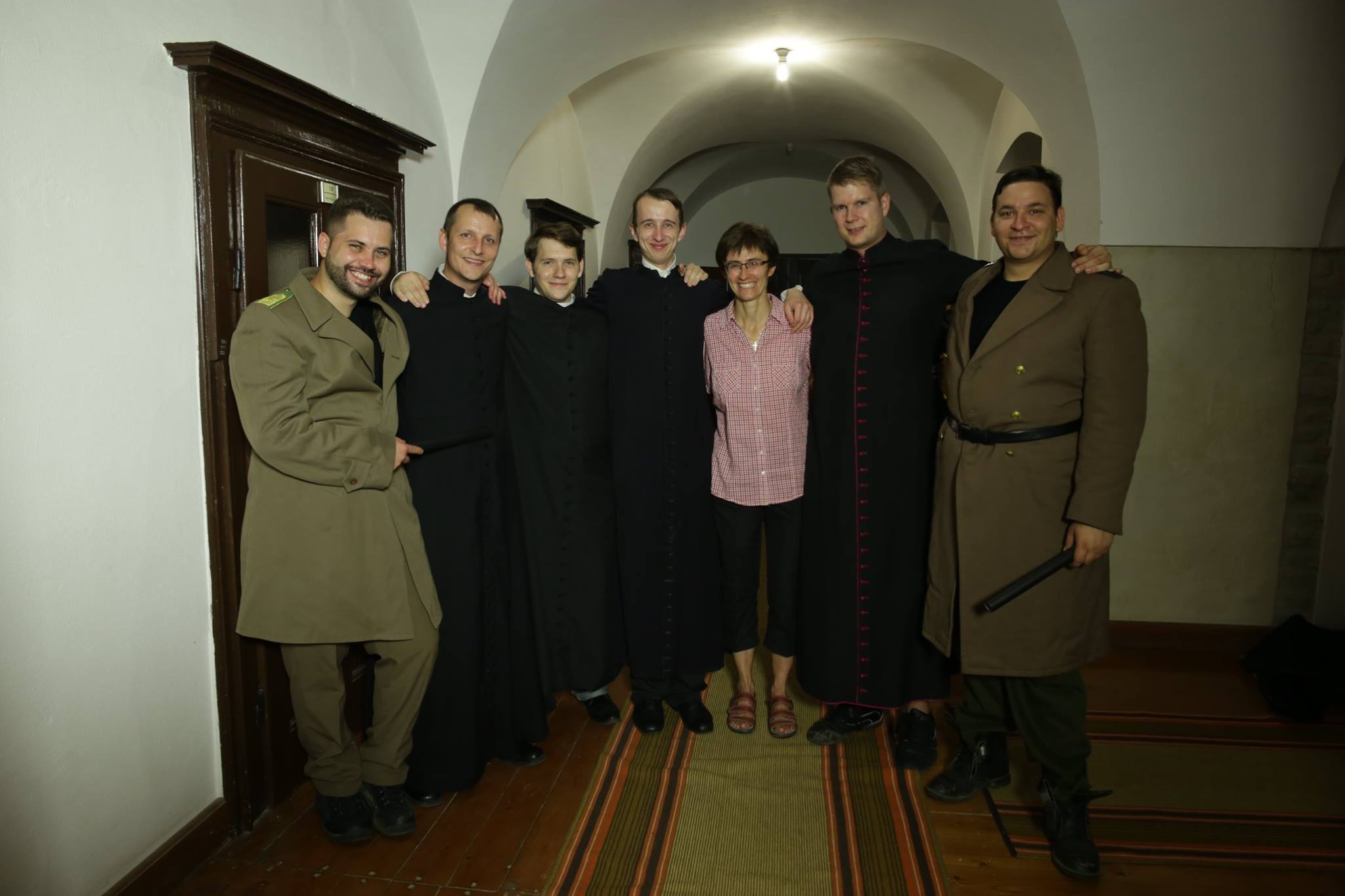
Film director, Cinzia Panero, with some of the actors.
 “While writing and then running the scenes,” says the director, “I also got to experience the power of that Love that opened the hearts of many people and institutions to give generously. The thank you list is quite long and will be well documented in the credits at the end of the film. Here, I would only like to mention the 50 actors – both professional and non – who were willing to wear heavy coats, scarves and winter clothing in the sweltering summer heat. Or the absolute availability and careful attention of Swing City Hotel in setting up a camera. We can never forget the costume designers who created and sewed the uniforms of 5 prisoners. But also the 70 people who contributed funds for the filming, equipment, advice and hearty awareness that they were involved in a project that was highlighting values such as giving, loyalty and making brave decisions. Border Men is a message for all of us: to be people of dialogue no matter where we are. Maria Chiara De Lorenzo See the Official English Trailer: https://www.youtube.com/watch?v=xq0TJEDaEg8 See webside: border.men.info@gmail.com
“While writing and then running the scenes,” says the director, “I also got to experience the power of that Love that opened the hearts of many people and institutions to give generously. The thank you list is quite long and will be well documented in the credits at the end of the film. Here, I would only like to mention the 50 actors – both professional and non – who were willing to wear heavy coats, scarves and winter clothing in the sweltering summer heat. Or the absolute availability and careful attention of Swing City Hotel in setting up a camera. We can never forget the costume designers who created and sewed the uniforms of 5 prisoners. But also the 70 people who contributed funds for the filming, equipment, advice and hearty awareness that they were involved in a project that was highlighting values such as giving, loyalty and making brave decisions. Border Men is a message for all of us: to be people of dialogue no matter where we are. Maria Chiara De Lorenzo See the Official English Trailer: https://www.youtube.com/watch?v=xq0TJEDaEg8 See webside: border.men.info@gmail.com
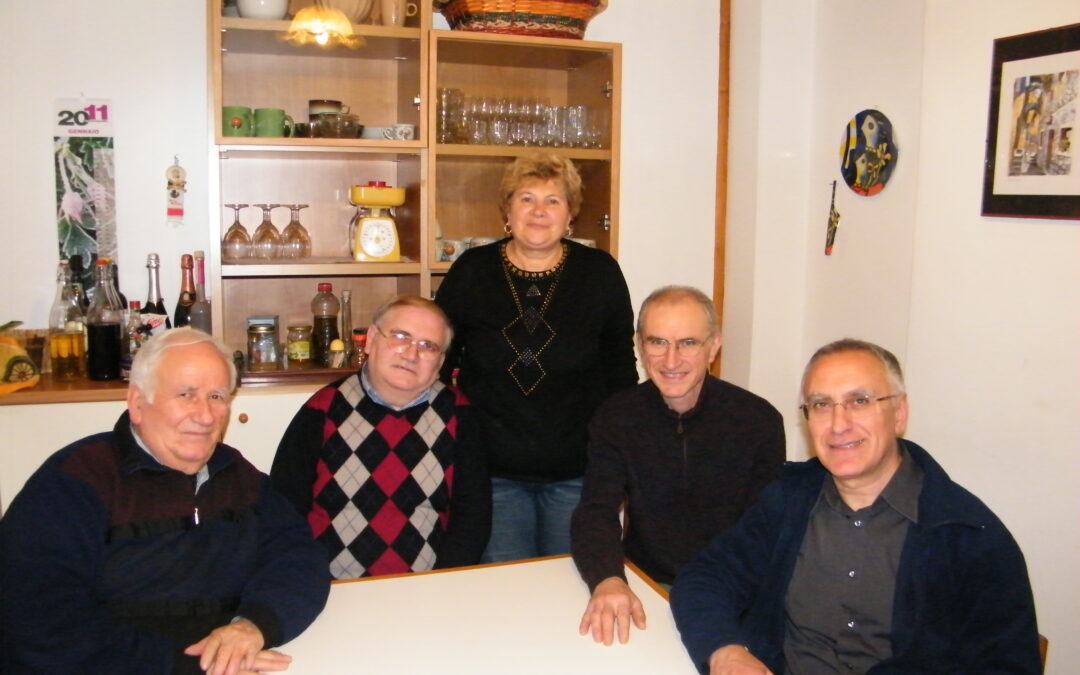
Feb 11, 2016 | Focolare Worldwide, Senza categoria
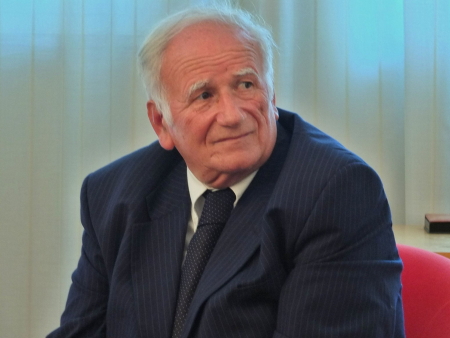 “I was still a child,” Alfonso from the class of 1945 recounts, “when my father was unjustly imprisoned. My mother and I would visit him in prison and, at such a tender age I realised how lonely the inmates were: people without hope or future – and without dignity. So, I promised myself that one day I would do something for them.” Alfonso had to wait for that chance. He enrolled in a course on volunteering and obtained permission to make visits to Rebibbia Prison, which currently has 1,700 inmates. They are serving time for the most varied crimes: drug dealing, sex abuse, mafia activity, extortion, murder, and more. Alfonso was aware that his efforts would be limited by the distrust of the inmates who belived they had lost any chance at redemption. In fact, many of them refused to let him approach. But he never gave up because he was convinced they were the image of the God he had chosen when he became a focolarino. Finally, one inmate named Giorgio who was serving time for a kidnapping that ended in tragedy, asked Alfonso to go to his mother, to embrace her and ask her to forgive him. Alfonso went and found the woman close to the end of her life. This totally unexpected, but long-awaited gesture, reconciled her to her son and the past. A few days later, she died peacefully. Alfonso stood by her son until his release from prison. He also helped Giorgio find temporary employment that restored his sense of dignity, enabling him to contribute to the support of the family.
“I was still a child,” Alfonso from the class of 1945 recounts, “when my father was unjustly imprisoned. My mother and I would visit him in prison and, at such a tender age I realised how lonely the inmates were: people without hope or future – and without dignity. So, I promised myself that one day I would do something for them.” Alfonso had to wait for that chance. He enrolled in a course on volunteering and obtained permission to make visits to Rebibbia Prison, which currently has 1,700 inmates. They are serving time for the most varied crimes: drug dealing, sex abuse, mafia activity, extortion, murder, and more. Alfonso was aware that his efforts would be limited by the distrust of the inmates who belived they had lost any chance at redemption. In fact, many of them refused to let him approach. But he never gave up because he was convinced they were the image of the God he had chosen when he became a focolarino. Finally, one inmate named Giorgio who was serving time for a kidnapping that ended in tragedy, asked Alfonso to go to his mother, to embrace her and ask her to forgive him. Alfonso went and found the woman close to the end of her life. This totally unexpected, but long-awaited gesture, reconciled her to her son and the past. A few days later, she died peacefully. Alfonso stood by her son until his release from prison. He also helped Giorgio find temporary employment that restored his sense of dignity, enabling him to contribute to the support of the family. 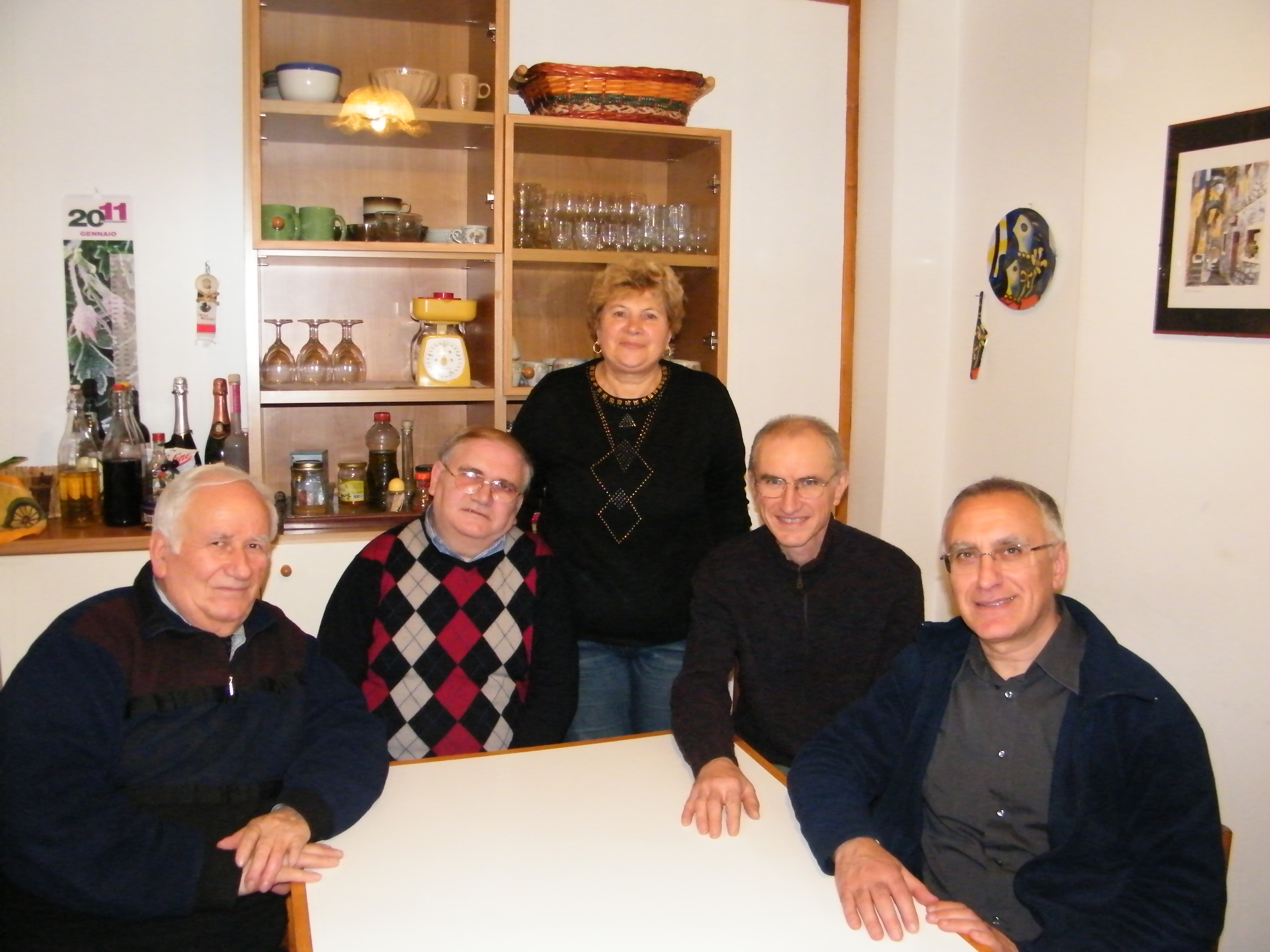 Through his visits with inmates, Alfonso has come to realise the importance of that fragile thread that connects them to the outside world. This is why he works so hard at keeping the relationship with families alive – especially with wives – and supporting families that find themselves in dire straits because of their relative’s imprisonment. This all takes time, people, energy and money. Alfonso never gave up. He began a project called “Always A Person” to show that prison does not take away a person’s human dignity, especially because God’s love for each one of us never diminishes. With 30 other volunteers – parents, professionals and ex-inmates – he has followed up with the families of 160 inmates, offering moral, economic and food support. The numbers grow each day. The spirit of the group is that of a focolare: “being family” for each inmate, being close to him and supporting him – never judging anyone’s past. In prison, words like trust and brotherhood take on deep meaning – especially mercy, an attitude that the volunteers say “acts on the person like a spring that helps them to get up again every time they’re tempted to let themselves go.” That’s how it was for Roberto who, after 8 years of incarceration and not finding any work, became homeless. Thanks to the “Always A Person” project he was accepted into a small welcome centre where he can practice his profession as a cook. There is also Francesco who had been a truck driver, but after 4 years in prison was not able to find a job because people didn’t trust him. Now, he belongs to the team of volunteers that prepares and delivers the packages for prisoners’ families. There are more stories like this one that are recounted in the books: “Ero carcerato…” and “Carcere e dintorni” written by Alfonso Di Nicola, and published by Città Nuova.
Through his visits with inmates, Alfonso has come to realise the importance of that fragile thread that connects them to the outside world. This is why he works so hard at keeping the relationship with families alive – especially with wives – and supporting families that find themselves in dire straits because of their relative’s imprisonment. This all takes time, people, energy and money. Alfonso never gave up. He began a project called “Always A Person” to show that prison does not take away a person’s human dignity, especially because God’s love for each one of us never diminishes. With 30 other volunteers – parents, professionals and ex-inmates – he has followed up with the families of 160 inmates, offering moral, economic and food support. The numbers grow each day. The spirit of the group is that of a focolare: “being family” for each inmate, being close to him and supporting him – never judging anyone’s past. In prison, words like trust and brotherhood take on deep meaning – especially mercy, an attitude that the volunteers say “acts on the person like a spring that helps them to get up again every time they’re tempted to let themselves go.” That’s how it was for Roberto who, after 8 years of incarceration and not finding any work, became homeless. Thanks to the “Always A Person” project he was accepted into a small welcome centre where he can practice his profession as a cook. There is also Francesco who had been a truck driver, but after 4 years in prison was not able to find a job because people didn’t trust him. Now, he belongs to the team of volunteers that prepares and delivers the packages for prisoners’ families. There are more stories like this one that are recounted in the books: “Ero carcerato…” and “Carcere e dintorni” written by Alfonso Di Nicola, and published by Città Nuova.
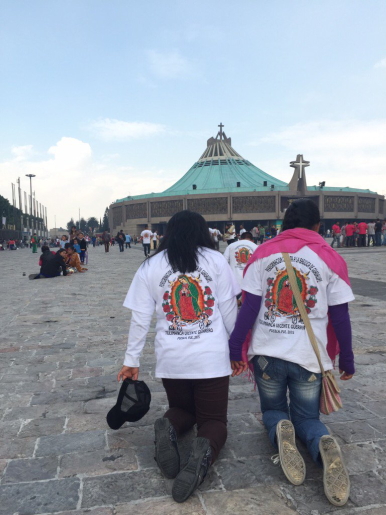
Feb 10, 2016 | Focolare Worldwide
 “Mexico City seems to be different today. There is a wave of hope, new life, and joy. The streets, phone booths, subways, and posters of the big avenues of the city, all announce the arrival of the Pilgrim from Rome, who wants, “like any other son, to come close to the Mother,” the beloved “Vírgin of Guadalupe”, Mother of all the Mexicans, Patron of the American continent, and according to many historians, the true author of unity of the Aztec nation. “I shall go to Our Lady like a pilgrim of mercy and peace. I am going to seek the Mexican people, who can give me something… I seek the deep faith you have, and I want to be contaminated with that richness of faith…,” Pope Francis said in the video-message sent to the Mexican people. And Mexico is preparing not only to receive him materially, but especially with the desire to receive with open hearts, the message of the “Bishop of Rome.” It is a message of hope, mercy, reconcilement, peace and fraternity. One feels a new attitude towards this pastoral visit. Of course there will be joy, emotion, and festivity, but also the desire to remain silent, listen and live it in depth. The Pope is coming in a particularly difficult time for our country, struck by violence, poverty and corruption, but in the messages he already sent to the Mexican people, Francis also conveyed his desire to come as “any man” and will involve every Mexican to help them bring out the best of themselves. In reading between the lines, we could almost say that his presence among us, if we manage to interpret and live it properly, can become a magnet for the many abilities our people possess, so as to radically swerve our path towards a more fraternal Mexico. The stages of the journey will not leave anyone out: Mexico City, Ecatepec, Chiapas, Morelia, and Ciudad Juárez. The pope will travel thousands of kilometres from the north to the south of the country. It will be a journey that will touch the neuralgic centres of conflicts, suffering, and at times even tragedies which Mexico is suffering, from the big city with its anonymity and social injustice, to the marginalised indigenous world, narcotraffick with all its violence, and the issue of border immigrants north of the country. The chosen itinerary and the activities to be held will launch a clear message: the Pope will come as a missionary of mercy and peace, especially for the most needy, and wants to share the wounds of this nation. Together with all the members of the Focolare Movement in the country, we have prepared ourselves by studying the teachings of Francis in depth, particularly the themes he will face in his visit: the youth, family, immigration, employment, and civilization of the aborigines. We want to receive his message, meet him and listen to him wherever he goes, even in the streets, and in the many routes his hoodless car will take. Moreover, we were called by the Mexican Episcopal Conference to collaborate, together with other ecclesiastical movements, in the visit’s logistics services especially in Mexico City. Welcome to Mexico, Pope Francis. With you we want to be missionaries of mercy and peace!.” From our news correspondents, Anabel Abascal and Raffaele Massolin Video-messaggio to the Mexican people: http://youtu.be/o8Y9VMFmOX0 Also consult: http://www.news.va/es/news/el-papa-a-los-mexicanos-voy-a-buscar-a-la-riquez-2 Official site: http://papafranciscoenmexico.org/
“Mexico City seems to be different today. There is a wave of hope, new life, and joy. The streets, phone booths, subways, and posters of the big avenues of the city, all announce the arrival of the Pilgrim from Rome, who wants, “like any other son, to come close to the Mother,” the beloved “Vírgin of Guadalupe”, Mother of all the Mexicans, Patron of the American continent, and according to many historians, the true author of unity of the Aztec nation. “I shall go to Our Lady like a pilgrim of mercy and peace. I am going to seek the Mexican people, who can give me something… I seek the deep faith you have, and I want to be contaminated with that richness of faith…,” Pope Francis said in the video-message sent to the Mexican people. And Mexico is preparing not only to receive him materially, but especially with the desire to receive with open hearts, the message of the “Bishop of Rome.” It is a message of hope, mercy, reconcilement, peace and fraternity. One feels a new attitude towards this pastoral visit. Of course there will be joy, emotion, and festivity, but also the desire to remain silent, listen and live it in depth. The Pope is coming in a particularly difficult time for our country, struck by violence, poverty and corruption, but in the messages he already sent to the Mexican people, Francis also conveyed his desire to come as “any man” and will involve every Mexican to help them bring out the best of themselves. In reading between the lines, we could almost say that his presence among us, if we manage to interpret and live it properly, can become a magnet for the many abilities our people possess, so as to radically swerve our path towards a more fraternal Mexico. The stages of the journey will not leave anyone out: Mexico City, Ecatepec, Chiapas, Morelia, and Ciudad Juárez. The pope will travel thousands of kilometres from the north to the south of the country. It will be a journey that will touch the neuralgic centres of conflicts, suffering, and at times even tragedies which Mexico is suffering, from the big city with its anonymity and social injustice, to the marginalised indigenous world, narcotraffick with all its violence, and the issue of border immigrants north of the country. The chosen itinerary and the activities to be held will launch a clear message: the Pope will come as a missionary of mercy and peace, especially for the most needy, and wants to share the wounds of this nation. Together with all the members of the Focolare Movement in the country, we have prepared ourselves by studying the teachings of Francis in depth, particularly the themes he will face in his visit: the youth, family, immigration, employment, and civilization of the aborigines. We want to receive his message, meet him and listen to him wherever he goes, even in the streets, and in the many routes his hoodless car will take. Moreover, we were called by the Mexican Episcopal Conference to collaborate, together with other ecclesiastical movements, in the visit’s logistics services especially in Mexico City. Welcome to Mexico, Pope Francis. With you we want to be missionaries of mercy and peace!.” From our news correspondents, Anabel Abascal and Raffaele Massolin Video-messaggio to the Mexican people: http://youtu.be/o8Y9VMFmOX0 Also consult: http://www.news.va/es/news/el-papa-a-los-mexicanos-voy-a-buscar-a-la-riquez-2 Official site: http://papafranciscoenmexico.org/
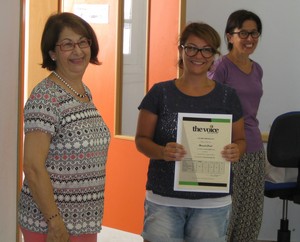
Feb 9, 2016 | Focolare Worldwide
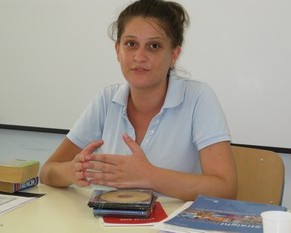 Coming down from the bus we immediately spot ““The Voice School of English”, situated in Pembroke, a few metres away the sea. The modern and spacious Malta National Sports School houses the Voice during the summer months. Andy, who co-ordinates the students’ visit to Malta, greets us with a big smile. She does not only know all the students by name, as actually all the teachers do, but she makes it a point to see that they receive the care and attention needed, while she works very closely even with the host families to ensure the comfort and well-being of each student. Together with Andy there is Vivienne, who has been working at The Voice since its very beginning 23 years ago; Maria, who after a long career in the Ministry of Education now offers her expertise as head of school, and Marilyn, who joined the school staff two years ago as director of studies. With her impressive record as teacher of English, Marilyn gives her precious contribution on pedagogical level; she follows very closely the academic progress of the students and she mentors the teaching staff to ensure support and progress in the teaching of English as a foreign language. The school prides itself with a team of professional and dedicated teachers. “The Voice” was founded in 1992 by a group of young people who decided to become personally involved in the Economy of Communion project launched by Chiara Lubich. Some of these young people are now the older generation who host students. Vivienne, who has been head of school for years and who still helps with its administration, looks back and relates: “Prior to the Voice I started a small business but the difficulties and problems I had to face made me decide to quit and promise that I would never attempt such a feat again. When I was roped in to help with the Voice, I discovered an economic activity motivated by different aspirations. This made me change my mind and till the present day I contribute wholeheartedly to make this project survive”.
Coming down from the bus we immediately spot ““The Voice School of English”, situated in Pembroke, a few metres away the sea. The modern and spacious Malta National Sports School houses the Voice during the summer months. Andy, who co-ordinates the students’ visit to Malta, greets us with a big smile. She does not only know all the students by name, as actually all the teachers do, but she makes it a point to see that they receive the care and attention needed, while she works very closely even with the host families to ensure the comfort and well-being of each student. Together with Andy there is Vivienne, who has been working at The Voice since its very beginning 23 years ago; Maria, who after a long career in the Ministry of Education now offers her expertise as head of school, and Marilyn, who joined the school staff two years ago as director of studies. With her impressive record as teacher of English, Marilyn gives her precious contribution on pedagogical level; she follows very closely the academic progress of the students and she mentors the teaching staff to ensure support and progress in the teaching of English as a foreign language. The school prides itself with a team of professional and dedicated teachers. “The Voice” was founded in 1992 by a group of young people who decided to become personally involved in the Economy of Communion project launched by Chiara Lubich. Some of these young people are now the older generation who host students. Vivienne, who has been head of school for years and who still helps with its administration, looks back and relates: “Prior to the Voice I started a small business but the difficulties and problems I had to face made me decide to quit and promise that I would never attempt such a feat again. When I was roped in to help with the Voice, I discovered an economic activity motivated by different aspirations. This made me change my mind and till the present day I contribute wholeheartedly to make this project survive”. 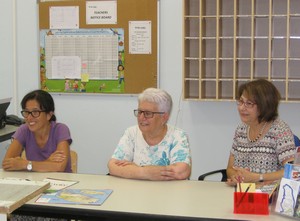 And notwithstanding difficulties and challenges the Voice is still offering its service to foreign students. Presently there are 47 English Language Schools in Malta and some of them cater for thousands of students, so one may wonder how such a small enterprise as the Voice still manages to keep going. Marilyn explains, “We aim at giving individual attention to each student, so the number of students in each class hardly ever exceeds 6; occasionally there is maximum of 8 students. Of course, this means that we have to employ more teachers! The school also offers one-to-one programmes that satisfy the student’s individual needs”. In this way, the teacher-student relationship becomes the pedagogical method, the key to linguistic progress, especially where the development of oral communication skills are concerned. The Voice experience continues with the host families, where students are given the opportunity not only to practise their English, but also to discover the Maltese culture and share the warm family atmosphere. Building relationships is a priority, explains Vivienne, a prerogative which gives the school its identity. “Here no student is a number; they are friends with whom we share all that we can, and even they share a lot with us”. This becomes even more evident during the Friday Certificate Award Ceremony when students who have finished the course wave good-bye to the rest of “community”, a term used by the students themselves. The Director of Studies has a word full of warmth and encouragement for each departing student, while the students’ faces reflect the pride of their achievement. Students interviewed speak of the family atmosphere created at the school. Karina says “I have found friends and very friendly teachers who really wish me well”, while Raffaella adds, “I feel encouraged to look for work when I go back home by the fact that my teacher at the Voice was younger than I; l would like to give my best, just like her”. In conformity with its values and its commitment towards the Economy of Communion, the Voice opts to employ and train new young members to join its team.
And notwithstanding difficulties and challenges the Voice is still offering its service to foreign students. Presently there are 47 English Language Schools in Malta and some of them cater for thousands of students, so one may wonder how such a small enterprise as the Voice still manages to keep going. Marilyn explains, “We aim at giving individual attention to each student, so the number of students in each class hardly ever exceeds 6; occasionally there is maximum of 8 students. Of course, this means that we have to employ more teachers! The school also offers one-to-one programmes that satisfy the student’s individual needs”. In this way, the teacher-student relationship becomes the pedagogical method, the key to linguistic progress, especially where the development of oral communication skills are concerned. The Voice experience continues with the host families, where students are given the opportunity not only to practise their English, but also to discover the Maltese culture and share the warm family atmosphere. Building relationships is a priority, explains Vivienne, a prerogative which gives the school its identity. “Here no student is a number; they are friends with whom we share all that we can, and even they share a lot with us”. This becomes even more evident during the Friday Certificate Award Ceremony when students who have finished the course wave good-bye to the rest of “community”, a term used by the students themselves. The Director of Studies has a word full of warmth and encouragement for each departing student, while the students’ faces reflect the pride of their achievement. Students interviewed speak of the family atmosphere created at the school. Karina says “I have found friends and very friendly teachers who really wish me well”, while Raffaella adds, “I feel encouraged to look for work when I go back home by the fact that my teacher at the Voice was younger than I; l would like to give my best, just like her”. In conformity with its values and its commitment towards the Economy of Communion, the Voice opts to employ and train new young members to join its team.  Moreover, an enterprise founded by young people cannot ignore the importance of offering work opportunities to youth. Claire, one of these young members of the staff, has been employed to guide and animate the afternoon leisure activities, because at the Voice it is not only English lessons that count but the whole shared experience, an opportunity to enhance the student’s personal development. In addition, Malta is a cultural and historical jewel…….and between a visit to the Pre-historic temples and the splendid Blue Grotto, one is often allowed enough time for a dip in the crystal clear water. Next time it might be the island of Comino and the Blue Lagoon, followed by a visit to the sister island of Gozo with its historical Citadel, or a visit to Valletta, the capital city where students can enjoy one of the most popular tourist attractions: an audio-visual show that tells all about the history and culture of the Maltese Islands. As days pass and one group “selfie” follows another, the school community changes; new arrivals are greeted with joy and there are hearty farewells for those who depart. At times the community circle widens because relatives holidaying in Malta join the school during its leisure activities. And more often than not, conversations at the beach tend to become serious talk on topics, such as the concept of the Economy of Communion that motivates the Voice, or on ideas about personal projects, or on issues that accompany one’s personal growth and professional development. Addresses and WhatsApp contacts are frequently exchanged……friendship does not end with the English course! Lately, new members who believe in the philosophy of the Economy of Communion have been invited by the Voice to join its group of directors; among them there is John, a consultant in Human Resources and Management, who specializes in the area of Tourism. The Voice looks forward to new developments! by Anouk Grevin Source: Economy of Communion Download brochure See the video: https://vimeo.com/135970956
Moreover, an enterprise founded by young people cannot ignore the importance of offering work opportunities to youth. Claire, one of these young members of the staff, has been employed to guide and animate the afternoon leisure activities, because at the Voice it is not only English lessons that count but the whole shared experience, an opportunity to enhance the student’s personal development. In addition, Malta is a cultural and historical jewel…….and between a visit to the Pre-historic temples and the splendid Blue Grotto, one is often allowed enough time for a dip in the crystal clear water. Next time it might be the island of Comino and the Blue Lagoon, followed by a visit to the sister island of Gozo with its historical Citadel, or a visit to Valletta, the capital city where students can enjoy one of the most popular tourist attractions: an audio-visual show that tells all about the history and culture of the Maltese Islands. As days pass and one group “selfie” follows another, the school community changes; new arrivals are greeted with joy and there are hearty farewells for those who depart. At times the community circle widens because relatives holidaying in Malta join the school during its leisure activities. And more often than not, conversations at the beach tend to become serious talk on topics, such as the concept of the Economy of Communion that motivates the Voice, or on ideas about personal projects, or on issues that accompany one’s personal growth and professional development. Addresses and WhatsApp contacts are frequently exchanged……friendship does not end with the English course! Lately, new members who believe in the philosophy of the Economy of Communion have been invited by the Voice to join its group of directors; among them there is John, a consultant in Human Resources and Management, who specializes in the area of Tourism. The Voice looks forward to new developments! by Anouk Grevin Source: Economy of Communion Download brochure See the video: https://vimeo.com/135970956
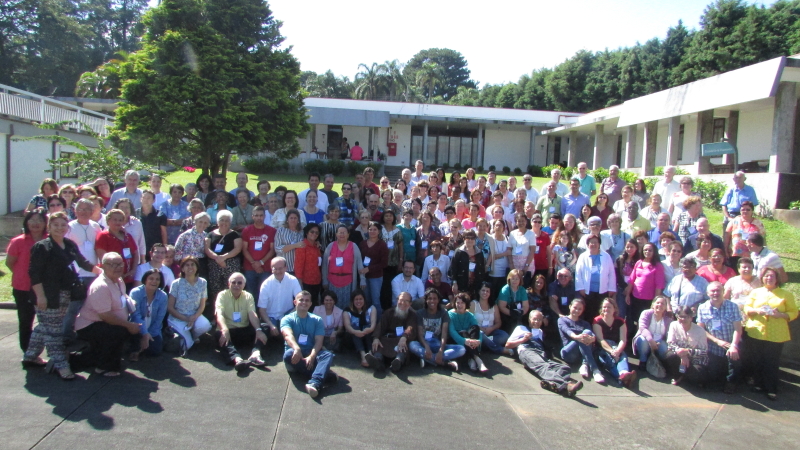
Feb 8, 2016 | Focolare Worldwide
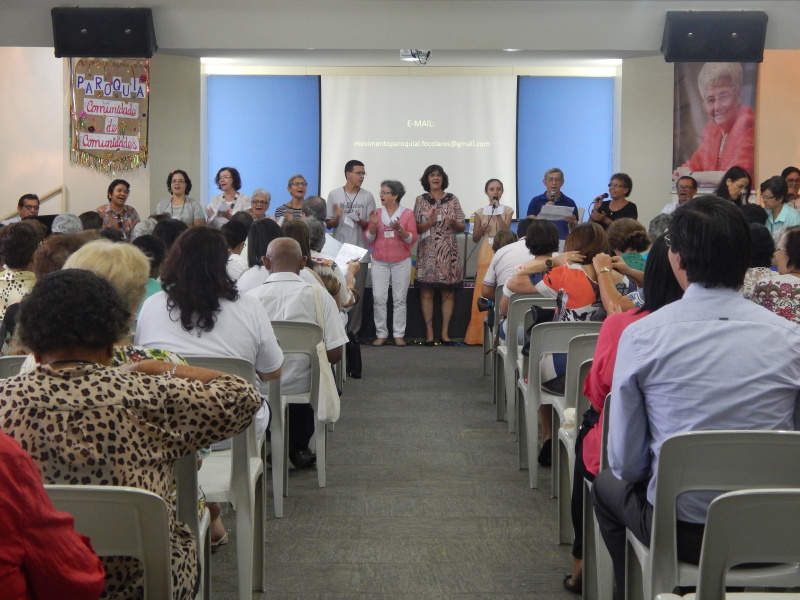 «I had been unjustly accused before the entire parish council. My answer was: silence, tears. After three days there was a phone call from that person, broken with emotion: “Will you forgive me?” and the answer, “I have already forgiven!!! Then a thought came to mind: it was not enough to forgive, but I could do more. So I invited that person to dinner, and a friendship was born, which will never be broken.» This is the story of Berenice, mother of three children, and a catechist for over 20 years, and then a minister of the Word in the five communities that make up the parish of Immaculata Conceção, in one of the peripheral districts of the immense city of Sao Paolo. These were flash backs of the many experiences recounted during the two “Schools of Communion” of the Parish Movement – branch of the Focolare Movement in the local Church – held from 22 to 24 January in the Ginetta Mariapolis, in Vargem Grande Paulista (SP) and from 30 to 31 January in the Mariapolis (Igarassu-Recife). The encounters focused on: Unity, the specific charism of the Focolare, with a particular stress on Mercy in this Holy Year. These were attended by 300 people consisting of the youth, lay adults, religious, seminarians, deacons and priests of 116 parishes in 27 dioceses from 16 Brazilian states. Together they testified to the force of forgiveness and mercy of evangelical love, which make the parish a community of communities, when this force and mercy are lived among the members of the movements.”
«I had been unjustly accused before the entire parish council. My answer was: silence, tears. After three days there was a phone call from that person, broken with emotion: “Will you forgive me?” and the answer, “I have already forgiven!!! Then a thought came to mind: it was not enough to forgive, but I could do more. So I invited that person to dinner, and a friendship was born, which will never be broken.» This is the story of Berenice, mother of three children, and a catechist for over 20 years, and then a minister of the Word in the five communities that make up the parish of Immaculata Conceção, in one of the peripheral districts of the immense city of Sao Paolo. These were flash backs of the many experiences recounted during the two “Schools of Communion” of the Parish Movement – branch of the Focolare Movement in the local Church – held from 22 to 24 January in the Ginetta Mariapolis, in Vargem Grande Paulista (SP) and from 30 to 31 January in the Mariapolis (Igarassu-Recife). The encounters focused on: Unity, the specific charism of the Focolare, with a particular stress on Mercy in this Holy Year. These were attended by 300 people consisting of the youth, lay adults, religious, seminarians, deacons and priests of 116 parishes in 27 dioceses from 16 Brazilian states. Together they testified to the force of forgiveness and mercy of evangelical love, which make the parish a community of communities, when this force and mercy are lived among the members of the movements.”  There were numberless fruits of the Word of God put into practice: in the districts of the outskirts where the laity took charge of finding the facilities to host the growing numbers of the faithful and the youth, who dedicated themselves to the various pastoral activities in the prisons or parish social works where the priority is to listen and pay attention to the person rather than to organization and material aid. Some undertook to initiate small encounters in the parishioners’ homes, bringing the Word of Life to the lives of families that are oftentimes far from the Church as in the case of Maria Hélia from a community of Marechal Deodoro. Bernadete lives in João Pessoa and is a catechist in the parish of Baby Jesus and a member of the archdiocesan team of catechists. She tries to share what she lives with a great openness to dialogue, starting from her family and relatives who belong to the evangelical church and Pentecostal associations. On Christmas Day she managed to involve everyone – including her husband who is not a Church goer – in a sketch of the birth of Jesus. “A spirit of dialogue and unity was established among all of us. We had a real Christmas!” During the conclusive meeting, the commitment declared by all was to become builders of unity within the communities, creating relationships in which, through mutual love, the Risen Christ is present and attracts and transforms everything, irradiating peace and joy. The objective was this: to have an open heart and fulfill “Jesus’ dream” when he prayed to the Father ”that all may be one.”
There were numberless fruits of the Word of God put into practice: in the districts of the outskirts where the laity took charge of finding the facilities to host the growing numbers of the faithful and the youth, who dedicated themselves to the various pastoral activities in the prisons or parish social works where the priority is to listen and pay attention to the person rather than to organization and material aid. Some undertook to initiate small encounters in the parishioners’ homes, bringing the Word of Life to the lives of families that are oftentimes far from the Church as in the case of Maria Hélia from a community of Marechal Deodoro. Bernadete lives in João Pessoa and is a catechist in the parish of Baby Jesus and a member of the archdiocesan team of catechists. She tries to share what she lives with a great openness to dialogue, starting from her family and relatives who belong to the evangelical church and Pentecostal associations. On Christmas Day she managed to involve everyone – including her husband who is not a Church goer – in a sketch of the birth of Jesus. “A spirit of dialogue and unity was established among all of us. We had a real Christmas!” During the conclusive meeting, the commitment declared by all was to become builders of unity within the communities, creating relationships in which, through mutual love, the Risen Christ is present and attracts and transforms everything, irradiating peace and joy. The objective was this: to have an open heart and fulfill “Jesus’ dream” when he prayed to the Father ”that all may be one.”
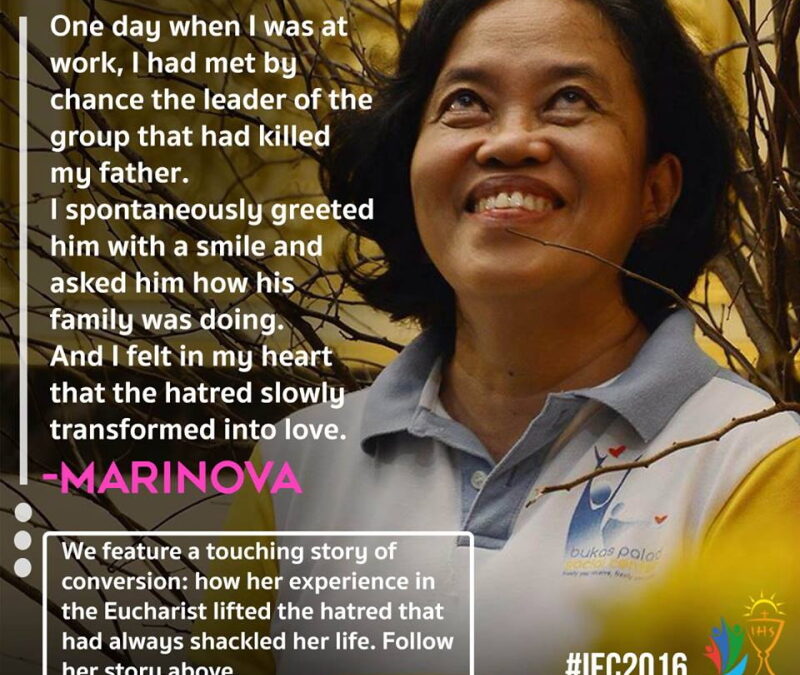
Feb 5, 2016 | Focolare Worldwide
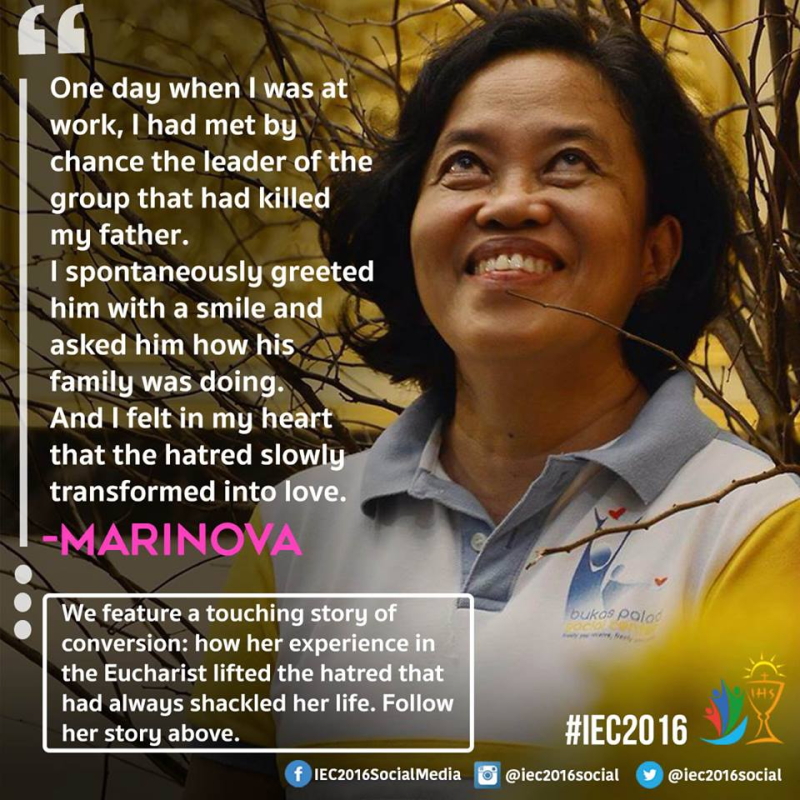 The 51st International Eucharistic Congress has been held in Cebu City, Philippines. (January 24th – 31st, 2016). The official social media coverage of the IEC 2016 scouted for meaningful life stories related to the Eucharist and published them in its facebook page (IEC2016SocialMedia). The experience of Marinova, a focolarina based in Cebu, touched them. “I was 11 years old when a big suffering came to my family. My father was killed by a group of persons who were very influential and no justice was served because we were poor. Our grandparents reminded us that true justice is found only in God! Thanks to their help I was able to finish college and got a job immediately. I became the bread winner of the family as I worked hard to help my mother. I incurred a lot of debts with loan sharks in order to bring ahead my family. Because of all these problems, an intense hatred developed in my heart for all those people who killed my father. They caused all the miseries in our life. Then I took up studies in Law because I wanted justice for the death of my father. But God had another plan for me. One of my classmates, a youth member of the Focolare Movement, invited me to a meeting of this ecclesial movement which has as its goal the fulfillment of Jesus’ prayer to the Father, ‘That they may all be one’, and strives to bring unity to the human family by translating the Gospel into life. A new adventure began in my life. I too started putting into practice the words of Jesus. He said: ‘Love and I will manifest myself to you. ‘Whatever you do to the least of your brethren you do it unto me.’ I became addicted to this new drug: LOVE… I found the essence and true meaning of my life and for the first time I felt that Jesus in the Eucharist was the source of it all. One day I asked Jesus to teach me how to live concretely his word ‘Love your enemy’, since I felt that hatred for those who killed my father still enveloped me. And indeed the following day, at work, I met by chance the leader of the group. Spontaneously I greeted him with a smile and asked him how everyone in his family was. I saw that this greeting was a great surprise for him. I was even more surprised by what I was did. Little by little I felt that the hatred within me was melting and was slowly being transformed into love! But that was only the first step! Love is creative! I felt that each one in the group should feel that we had forgiven him. Together with one of my brothers, we visited them trying to re-build our relationship and to make them understand that God loves them! It came to a point that one of them asked for forgiveness for what he had done and in turn asked for prayers for his family and his health. I knew clearly that this experience of forgiveness and healing was the transforming power of Jesus in the Eucharist.”.
The 51st International Eucharistic Congress has been held in Cebu City, Philippines. (January 24th – 31st, 2016). The official social media coverage of the IEC 2016 scouted for meaningful life stories related to the Eucharist and published them in its facebook page (IEC2016SocialMedia). The experience of Marinova, a focolarina based in Cebu, touched them. “I was 11 years old when a big suffering came to my family. My father was killed by a group of persons who were very influential and no justice was served because we were poor. Our grandparents reminded us that true justice is found only in God! Thanks to their help I was able to finish college and got a job immediately. I became the bread winner of the family as I worked hard to help my mother. I incurred a lot of debts with loan sharks in order to bring ahead my family. Because of all these problems, an intense hatred developed in my heart for all those people who killed my father. They caused all the miseries in our life. Then I took up studies in Law because I wanted justice for the death of my father. But God had another plan for me. One of my classmates, a youth member of the Focolare Movement, invited me to a meeting of this ecclesial movement which has as its goal the fulfillment of Jesus’ prayer to the Father, ‘That they may all be one’, and strives to bring unity to the human family by translating the Gospel into life. A new adventure began in my life. I too started putting into practice the words of Jesus. He said: ‘Love and I will manifest myself to you. ‘Whatever you do to the least of your brethren you do it unto me.’ I became addicted to this new drug: LOVE… I found the essence and true meaning of my life and for the first time I felt that Jesus in the Eucharist was the source of it all. One day I asked Jesus to teach me how to live concretely his word ‘Love your enemy’, since I felt that hatred for those who killed my father still enveloped me. And indeed the following day, at work, I met by chance the leader of the group. Spontaneously I greeted him with a smile and asked him how everyone in his family was. I saw that this greeting was a great surprise for him. I was even more surprised by what I was did. Little by little I felt that the hatred within me was melting and was slowly being transformed into love! But that was only the first step! Love is creative! I felt that each one in the group should feel that we had forgiven him. Together with one of my brothers, we visited them trying to re-build our relationship and to make them understand that God loves them! It came to a point that one of them asked for forgiveness for what he had done and in turn asked for prayers for his family and his health. I knew clearly that this experience of forgiveness and healing was the transforming power of Jesus in the Eucharist.”.

 “While writing and then running the scenes,” says the director, “I also got to experience the power of that Love that opened the hearts of many people and institutions to give generously. The thank you list is quite long and will be well documented in the credits at the end of the film. Here, I would only like to mention the 50 actors – both professional and non – who were willing to wear heavy coats, scarves and winter clothing in the sweltering summer heat. Or the absolute availability and careful attention of Swing City Hotel in setting up a camera. We can never forget the costume designers who created and sewed the uniforms of 5 prisoners. But also the 70 people who contributed funds for the filming, equipment, advice and hearty awareness that they were involved in a project that was highlighting values such as giving, loyalty and making brave decisions. Border Men is a message for all of us: to be people of dialogue no matter where we are. Maria Chiara De Lorenzo See the Official English Trailer: https://www.youtube.com/watch?v=xq0TJEDaEg8 See webside: border.men.info@gmail.com
“While writing and then running the scenes,” says the director, “I also got to experience the power of that Love that opened the hearts of many people and institutions to give generously. The thank you list is quite long and will be well documented in the credits at the end of the film. Here, I would only like to mention the 50 actors – both professional and non – who were willing to wear heavy coats, scarves and winter clothing in the sweltering summer heat. Or the absolute availability and careful attention of Swing City Hotel in setting up a camera. We can never forget the costume designers who created and sewed the uniforms of 5 prisoners. But also the 70 people who contributed funds for the filming, equipment, advice and hearty awareness that they were involved in a project that was highlighting values such as giving, loyalty and making brave decisions. Border Men is a message for all of us: to be people of dialogue no matter where we are. Maria Chiara De Lorenzo See the Official English Trailer: https://www.youtube.com/watch?v=xq0TJEDaEg8 See webside: border.men.info@gmail.com




 “I was still a child,” Alfonso from the class of 1945 recounts, “when my father was unjustly imprisoned. My mother and I would visit him in prison and, at such a tender age I realised how lonely the inmates were: people without hope or future – and without dignity. So, I promised myself that one day I would do something for them.” Alfonso had to wait for that chance. He enrolled in a course on volunteering and obtained permission to make visits to Rebibbia Prison, which currently has 1,700 inmates. They are serving time for the most varied crimes: drug dealing, sex abuse, mafia activity, extortion, murder, and more. Alfonso was aware that his efforts would be limited by the distrust of the inmates who belived they had lost any chance at redemption. In fact, many of them refused to let him approach. But he never gave up because he was convinced they were the image of the God he had chosen when he became a
“I was still a child,” Alfonso from the class of 1945 recounts, “when my father was unjustly imprisoned. My mother and I would visit him in prison and, at such a tender age I realised how lonely the inmates were: people without hope or future – and without dignity. So, I promised myself that one day I would do something for them.” Alfonso had to wait for that chance. He enrolled in a course on volunteering and obtained permission to make visits to Rebibbia Prison, which currently has 1,700 inmates. They are serving time for the most varied crimes: drug dealing, sex abuse, mafia activity, extortion, murder, and more. Alfonso was aware that his efforts would be limited by the distrust of the inmates who belived they had lost any chance at redemption. In fact, many of them refused to let him approach. But he never gave up because he was convinced they were the image of the God he had chosen when he became a  Through his visits with inmates, Alfonso has come to realise the importance of that fragile thread that connects them to the outside world. This is why he works so hard at keeping the relationship with families alive – especially with wives – and supporting families that find themselves in dire straits because of their relative’s imprisonment. This all takes time, people, energy and money. Alfonso never gave up. He began a project called “
Through his visits with inmates, Alfonso has come to realise the importance of that fragile thread that connects them to the outside world. This is why he works so hard at keeping the relationship with families alive – especially with wives – and supporting families that find themselves in dire straits because of their relative’s imprisonment. This all takes time, people, energy and money. Alfonso never gave up. He began a project called “






